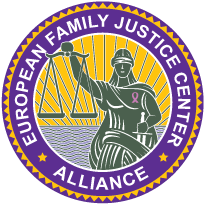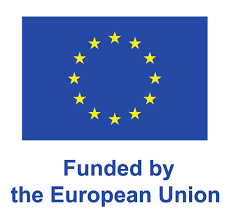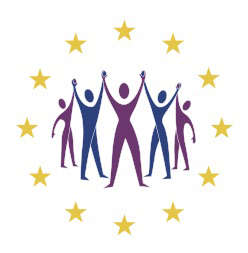Report EFJCA-conference 2018 - 14, 15 and 16 November 2018, Paris
One Safe Place for Hope and Empowerment
The EFJCA, The “Maison des Femmes” – FJC Paris and the Kering Foundation organized together the 2nd International Conference of Family Justice Centers and co-related multidisciplinary centers in Paris. The 120 participants from 15 countries from Europe, USA and Canada participated on a range of activities during three days in November.
Renewed movie about the European Family Justice Centers
During the conference the renewed movie about the European Family Justice Centers was launched:
Photo-impression
Here you find a photo-impression of the conference:
- Visit Maison des Femmes
- Breakfast meeting National Assembly Paris
- Annual meeting EFJCA 2018
- 15 November 2018
- 16 November 2018
Report of the Activities
14 November 2018
Breakfast meeting at the National Assembly
The 14th of November started with a breakfast meeting at the National Assembly, Hotel de la Questière in Paris, where Ghada Hatem, director of Maison des Femmes and the EFJCA presented the multidisciplinary work of the FJCs and specific of the Maison des Femmes at the politicians who attended the breakfast meeting.
Visits of “Maison des Femmes” – FJC Paris
Maison des Femmes organized two visits on the 14th. In the morning, the first group of FJC-members visited the Center and had an exchange meeting with the staff of the FJC.
In the afternoon, a second group of visitors from Sweden, Iceland and Moldava took the second tour, to get to know the center and her activities.
Annual meeting EFJCA
The annual meeting of the EFJCA took place on the 14th in the afternoon. The Kering Foundation was so generous to offer our members a warm welcome, lunch and space.
The attendees exchanged good practices, looked backwards and towards the future and shared hope-stories from their centers and networks.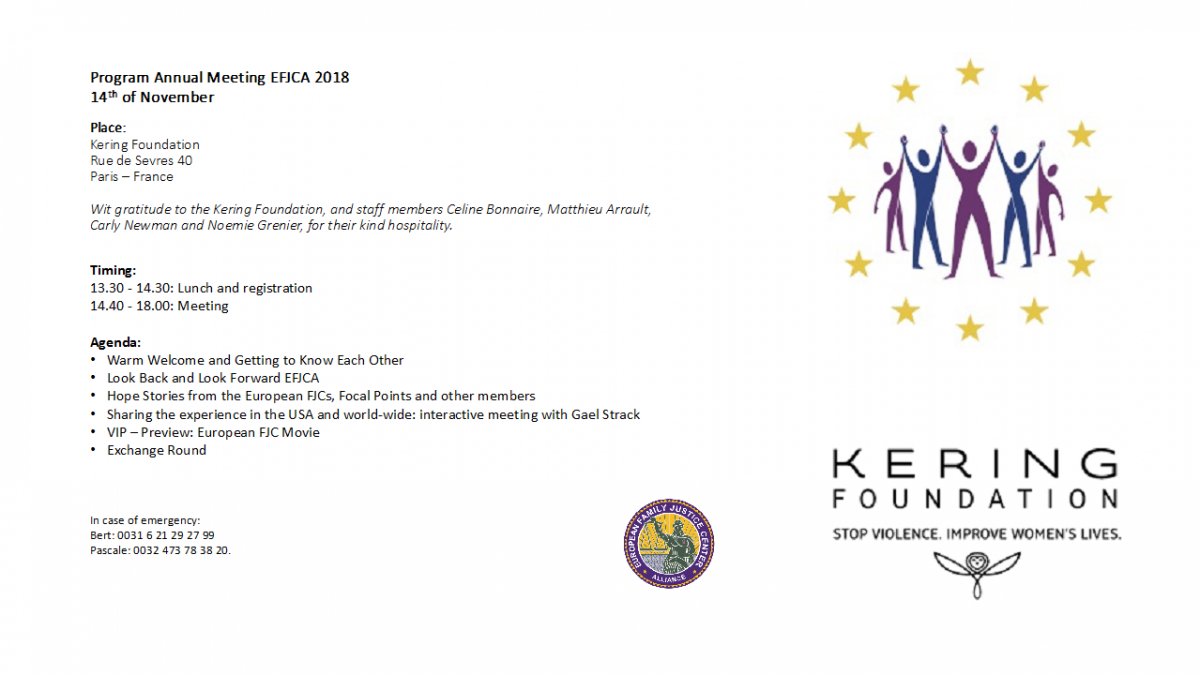
The participants shared stories of Hope from their centers and networks:
- FJC Antwerp: storytelling project
- FJC Iceland: new FJC in the north of the country
- FJC Mechelen: win-win with psychologist of ‘House of the child’
- FJC Milan: a lot of progress via collaboration with a big partner, with the help of the EFJCA and the Kering Foundation
- FJC Berlin: gathering momentum for renewed attempt with the Berlin partners
- FJC Limburg: the police chiefs of the larger FJC region have been convinced to invest
- Alliance for Hope International: Casey’s book ‘Hope Rising’, asking co-workers ‘Where did you see hope today?’, Camp Hope – everyone who participated went to college
- Netherlands: national DV programme of 3,5 years, 3 multidisciplinary centers
- FJC Turnhout: involving partners from a broader scope & making a new start
- OECD: how can we support FJC’s, who do we need to convince, the importance of durable funding systems, …
- WONCA – special interest group on DV: building a collaborative care model
The new FJC-movie was previewed by the members.
Gael Strack, CEO of the Alliance for Hope International, shared her vision on the International FJC-movement:
- Powerful video: let’s create an international culture of hope
- Importance of evaluation: what do clients think, but also what do professionals think (professional empowerment), how do you keep high standards
- Culture of hope: believing you can save lives will change your attitude -> the bridge between the impossible and the possible is hope
- Leadership conference:
- Camp Hope: 1 million (Verizon), in 15 States
- 135 in US, 100 want to start (also within hospital, university campus)
- Webinars: voices, …
- Risk assessment: new RTI with 5 questions for hospitals
- Research into assumed suicide that is strangulation
- Poly-victimisation: the whole person, continuum of trauma, changes the way FJC’s work with victims, and changes the way clients think about FJC’s (more victims that come back)
- Need for new funding: make the pie bigger
- Need for strategic thinking - The benefits of what an FJC does, will often only be visible after 5 to 10 years
- The power of snapshots: how do we measure success? -> checklist (how does the FJC work, what do victims say, doing an intake as a victim, anonymous interviews, talking with partners, …)
- The importance of steady leadership
- The importance of the dynamics of growth, of integrating new partners
- The use of new apps
- The importance of an organic growth, momentum building, ‘the starts have to align’
INTERNATIONAL CONFERENCE PLENARY SESSION 15 November 2018
The first day of the conference we held a plenary session with a range of interesting speakers. The Ordre de Paris was so kind to host us during the two conference days in Maison du Barreau on Ile de la Cité in the middle of Paris, a beautiful location for an inspiring exchange.
Programme:
During the programme, 4 video’s with voices and story-telling by survivors were shown.
Opening by Marie-Aimée Peyron, Mme le Bâtonnier de l’Ordre de Paris
Mme Peyron welcomed the participants and shared her support to the “Maison des Femmes” and the FJC-movement.
Opening by Gabriela Ramos, OECD Chief of Staff and Sherpa to the G20
- 2018: gender strategy -> one of biggest concerns is violence against women -> issue G7
- 31% women worldwide have experienced violence
- Not one country in the world has 100% equality
- Ban sexism in advertising, games, other screens…
- OECD recommendations: prevention, protection, prosecution
- Integrated approach to help victims, accessible, integrated service centers
- Need for specialist trauma training
- Need for perpetrator programs
- International cooperation: G20 -> gender is a leadership topic, sharing good practices
- You can count on the OECD!
Welcome and introduction, by Ghada Hatem, Director “Maison des Femmes” and Pascale Franck, Co-director FJC Antwerp and Vice-president EFJCA
Survivor Story
One Safe Place for Hope and Empowerment, by Gael Strack, CEO of Alliance for Hope International and Susan Williams, Office for Victims of Crime
Susan Williams talked about the FJC-development and movement and the Coordinated Community Response.
The European FJC movement, by Bert Groen, President of the EFJCA, and movie of the European FJCs
Organisation of the Unités Médico-Judiciaires in France, by dr Céline Denis, forensic doctor of the Jean Verdier Hospital in Bondy
The role of the police in a multidisciplinary approach, by Oliver Slosse, Assistant Director Strategy and Policy, Local Police Brussels Capital Ixelles
A Good Example in France: FJC Paris “Maison des Femmes”, by Ghada Hatem, Director Maison des Femmes and Céline Bonnaire, director Kering Foundation
Children as the most vulnerable individuals in gender-based violence and domestic violence, by Margreet Visser, clinical psychologist Child & Youth Trauma Center Kenter, The Netherlands
Perpetrators care: embody the victim, by Linda Trommeleu, psychologist, family therapist specialised in domestic violence and working with perpetrators
- On the profile of perpetrators: PTSD, fear, fobia, lack of empathy, narcism, …
- Program for the prevention of re-offending: 11 sessions (1 per week) -> working with non-verbal signals is highly important
What role for specialised organisations in public policies that combat violence against women?, by Francoise Brié, executive director of the Federation Nationale Solidarité Femmes (FNSF)
The FJC of Milan, by Alessandra Kustermann, doctor gynaecologist and director of the FJC
PPT Alessandra Kustermann will follow
Engaging men and boys, by Gary Barker, president and CEO of Promundo
Overall considerations within the European context
Reflexions Gary
- Insight in what works for prevention -> under one roof -> also attention for prevention (often done by police, psycho-social services)
- UK: lot of money in evidence-based / what works for prevention of GBV
- EU: Daphne -> need more scale
- How can we turn up the volume for prevention? The moment is now (me too…). Promote other ideas for manhood. Positive expressions of emotions by boys, …
- Encourage Europe’s policy makers
- Questions:
- Importance of working with younger boys
- Also working with women in producing a positive manhood
Reflexions Gael
- Words: inspiring, motivating, educational, …
- Themes: international issue, collaboration and innovation (small, medium, large)
- Secrets of success: strategic direction that will stand the test of time (advisors), leadership matters, determination, commitment to best practices and implementing them, core guiding principles, accountability to survivors, …
- Dreamers, planners and do-ers -> we need them all
Casey Gwinn: video message
COCKTAIL PARTY 15 November 2018
Maison des Femmes, the Kering Foundation and the EFJCA invited the participants to a cocktail party, hosted by the Columbia Global Centers at Reid Hall in the Montparnasse neighbourhood, an evening treat with champagne and tasty finger food at this marvellous location. The mezzo-soprano Roula Safar touched the audience with a heart-warming performance of music and songs, related to the situation of women and girls.
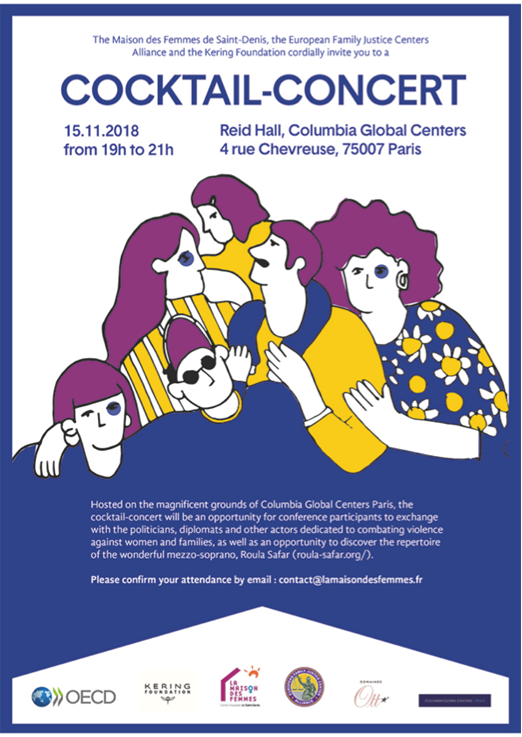
INTERNATIONAL CONFERENCE PARALEL SESSIONS: TRAINING NON-FATAL STRANGULATION AND “HOW-TO-START-A-FAMILY-JUSTICE-CENTER” 16 November 2018
Plenary session
Understanding the timeframe of PTSD to offer more adapted multidisciplinary solutions, by Thierry Baubet, doctor psychiatrist and specialist in child and adolescent trauma care
- PPT Thierry Baubet will follow
The participants had a choice between two day-sessions: training Non-Fatal Strangulation and session “How-to-start-a-Family-Justice-Center”
Training Non-Fatal Strangulation
By Gael Strack, CEO of Alliance for Hope International and CEO of the Training Institute on Strangulation Prevention
Strangulation has been identified as one of the most lethal forms of domestic violence and sexual assault: uncon- sciousness may occur within seconds and death within minutes. When domestic violence perpetrators choke (strangle) their victims, not only is this felonious assault, but it may be an attempted homicide. Strangulation is an ultimate form of power and control where the batterer can demonstrate control over the victim’s next breath: it may have devastating psychological effects or a potentially fatal outcome. Strangulation is more common in domestic violence cases than previously thought. It can have serious health implications for women and their unborn children and can ultimately lead to their death.
- Background of the Training
- Strangulation: The Last Warning ShotPart I: History, Need, Lethality & Medical
- Strangulation: The Last Warning ShotPart II (Investigation/Prosecution/Advocacy)
“How-To-Start-A-Family-Justice-Center”
10 steps to start a FJC, by Davy Simons, co-director FJC Antwerp and Michele Rabaiotti, Focal Point EFJCA Milan
Interaction with the participants:
- How can you measure the readiness of a region? Finding good allies, overcoming resistance, creating momentum, conference (big + with key actors), starting bottom-up or top-down (for example start bottom-up and then involve the top), involve existing experiences)
- How to come to a common goal? Which problems are there, the common goal is the victim (not to preserve the organisation itself), repeating the common goal like a mantra
- How can you create readiness in a region? When something bad happens you can get momentum, use facts to persuade, create urgency
The client central in a multidisciplinary approach, by Ghada Hatem, director of FJC Maison des Femmes and team
Interaction with the participants:
- How do you work together with women’s services? We know a lot of these services that find themselves in other places (shelters, ngo’s, …) and we can refer to them and/or work together
The role of perpetrator programs in a community multidisciplinary approach, by Alessandra Pauncz, executive director WWP
Interaction with the participants:
- Working with honour-based violence? Focus next two years in working with migrants
- Which kind of programs/models? It varies: in some countries self-referred, in some mandatory, in some a mixture + some only work with perpetrators, some with the whole family + some on an individual basis, most with groups or a mixture + some from a feminist point of view, others from different ‘cultures’ + some in the jail system, others in probation
The strategic planning, culture and services of a FJC, by Pascale Franck, co-director FJC Antwerp and vice-president EFJCA and Bert Groen, president EFJCA
Interaction with the participants:
- Strategic planning is crucial for health and wellbeing of FJC’s, mostly takes more than 1 year in the beginning
Working together in Sexual Assault Referral Centers, by Cath White, forensic physician and clinical director of St Mary's Sexual Assault Referral Centre Manchester U.K.
Interaction with the participants:
- Focus: often too narrow, too much focused on criminal justice
- How many victims of incest? Very common, but it is not one size fits all, we still have a lot to learn
Multifocus, a system oriented approach of gender-based violence, by Lienja van Eijkern, sr. advisor, Mutsaers Foundation, the Netherlands
Interaction with the participants:
- About the hierarchy of Engel? Looking at the whole person, family, … (micro -> macro)
- How do you empower families? The family keeps making the decisions, we are advising, but they have their own ideas what should happen
Children in a Multidisciplinary setting, by Nadège Severac, Sociologist at the National observatory for the Protection of Children
Moral deliberation, by Julien Topal, Governance and Integrity
Interaction with the participants:
- Who has the right to make discussion? People are autonomous, they have the first right to make decision, but it differs on a case-to-case base (when children are involved)
Closing remarks
- Together we can make a big difference in the life of victims
- Many topics: strangulation, …
- Alliances are growing
- Next year’s conference is in Iceland
Some reactions of the participants:
- We see clearly the importance of a pro-active and long-term approach of gender-based and domestic violence.
- Non-fatal strangulation needs much more attention and disclosure.
- We need to invest in knowledge about non-fatal strangulation.
- Multidisciplinary approach is necessary to achieve real results.
- Thank you for all this input: we surely stay in contact!
- Expertise in trauma sensitive care is really needed in the approach of gender based and domestic violence.
- People, many people are working together towards common sense solutions for families impacted by trauma. This is so important.
- More conferences like this!
- Go on what you are doing!
- The FJC is possible to start if you begin with what already works. And focus on the needs of the survivors.
- Most important message = the great collaboration the FJCs have, and the international working together.
- Come to Sweden!
- Perspectives, context and knowledge about honour related violence, an important topic.
- The most important message to take home is the fantastic collaboration between the police force and NGO’s and civil society, in terms of domestic violence and protection of victims. And the tools to move on.
- We need more understanding from those who have the mandate to make a change: the politicians. They have the power to put in tax payer’s money to build a safe world for victims.
- The most important message = the survivors’ needs are the starting point. Use their experience to build the supporting structure.
- Most important message = start small and dream big.
- Thank a lot for this very interesting conference.
- Most important message = FJC as an example! It’s possible to build a FJC. Take the survivor in focus. And that you are so supportive!
- Prise en charge globale, créer une culture commune, une culture de nous, ….
- Mettre en place des groupes d’échange de pratique pour progresser dans nos pratiques.
- Nous sommes très heureux d’avoir découvert les pratiques d’autres pays.
- L’union fait la force !
- Most important message = that the upbringing and culture of manhood has much influence on boys/men’s use of violence.
